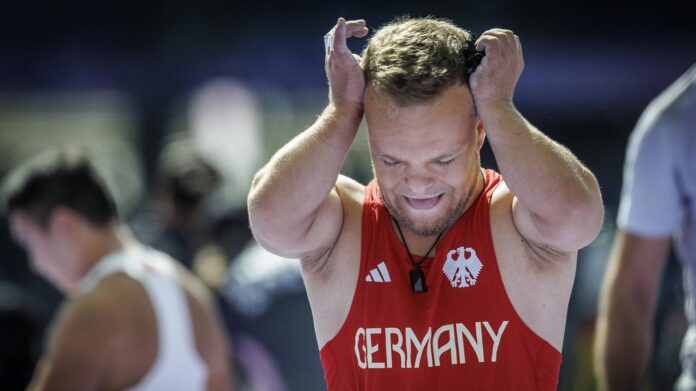In a small group on Tuesday morning, the German team took a look at the first half of the Paralympic Games in Paris. What were the successes? What went well and what didn’t? The half-time review was livened up with exciting reports from two medal winners from the Paris Games.
Niko Kappel won silver in the shot put on Monday – and was able to celebrate the non-gold medal one day later. The 29-year-old described the games in Paris as the best he has ever seen. He praised the atmosphere, mood and the crowd in the Stade de France. In the next few days, the silver medalist plans to soak up the atmosphere not only in the athletics stadium, but in Paris in general, as much as he can.
Maurice Wetekam also shared this opinion. The 18-year-old para-swimmer won bronze in his Paralympics debut and thus brought a fresh and new perspective to the group. “Everyone here is nice to each other,” said Wetekam. This is one reason that makes the games so special for him. He still can’t fully grasp his success on Saturday, the first German medal in Paris. “It’s slowly sunk in. I couldn’t have imagined it any better.” This Thursday, the young swimmer will start in the 200 meter individual medley and is looking forward to the competition with great excitement.
Karl Quade, who has been the head of mission of the German Paralympics delegation for decades, then took stock. At that point, the Germans were in 23rd place in the medal table with 16 medals. According to Quade, that was less than some had expected – especially in athletics. Friedhelm Julius Beucher, President of the German Disabled Sports Association, had predicted a placement among the top ten nations.
“We have experienced positive surprises, but we have also experienced disappointments, we have to admit that quite openly,” said the 69-year-old Quade. As an example, he cited the para-athlete Léon Schäfer, who narrowly missed a medal with two fourth places.
Quade highlighted the young Wetekam as positive surprises as well as the Para table tennis doubles of Stephanie Grebe and Juliane Wolf, who won silver on Saturday. However, he did not want to draw a clear conclusion on Tuesday morning, as there were still some promising competitions to take place. He stressed that it was important to analyse the performances – both positive and negative. Especially considering that the level of performance at the Games as a whole is constantly increasing.
“The range is getting much wider in many disciplines. And that means that you might not win there anymore,” said the head of mission, who praised the German team for its good presentation during state visits, such as that of the Federal President last week. Quade, who has already coached the German team 15 times at the Paralympics, also had words of praise for the host city of Paris: “In my opinion, the village is top-notch, there is not much that can be improved.” He also highlighted the stadiums and fans, who turn up in large numbers at most competitions.
On the subject of accessibility in Paris, which was widely criticized in the run-up to and during the games, Quade found diplomatic words: “We are in a complicated city when it comes to that. You have to live with it.” The athletes Kappel and Wetekam also preferred to highlight positive developments at the Paralympics rather than criticize the lack of accessibility, especially in public transport.
The head of the German delegation, however, was a little more succinct on the much-discussed topic of transgender athletes. “For the time being, we respect the decisions of the international associations, but we demand clear rules for the future,” he said, criticizing the International Paralympic Committee’s rules, which he considered “too thin” in comparison to the rules at the Olympic Games. On Monday, Italian Valentina Petrillo became the first openly trans athlete to compete in the Paralympics.
